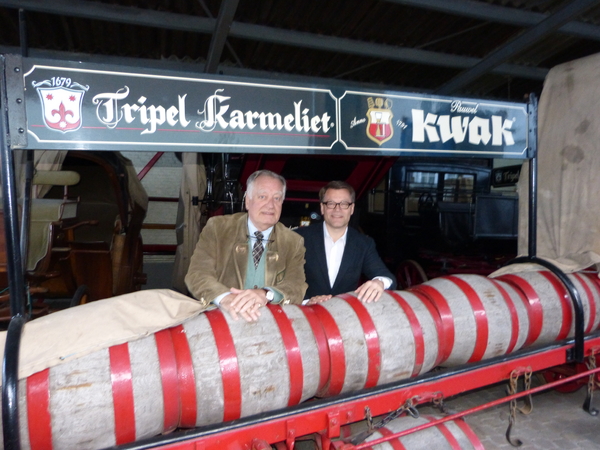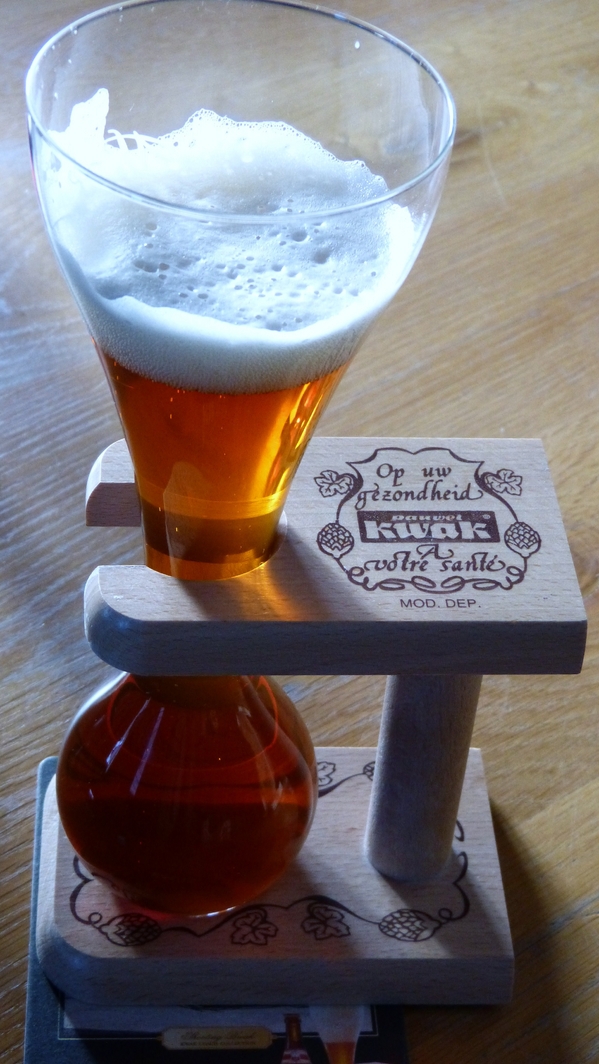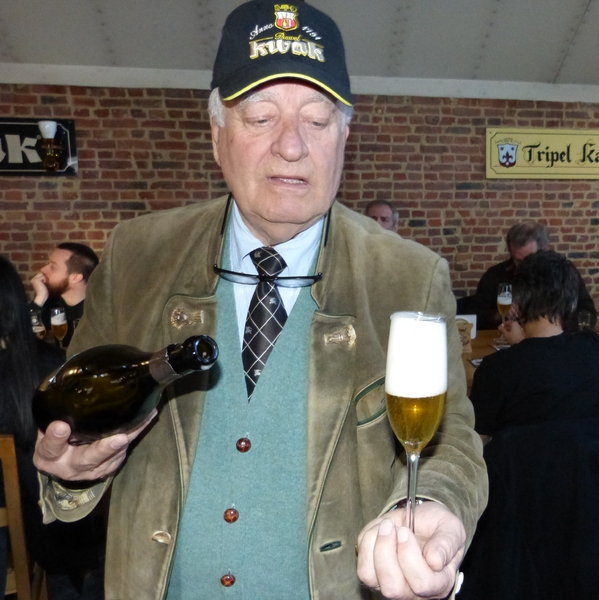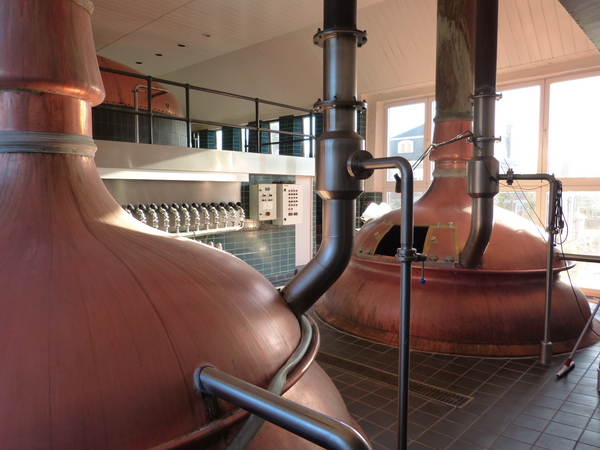A brewery that's older than Belgium
Added: Monday, December 30th 2013

How many breweries can state they are older than the country they’re based in? Bosteels was founded in 1791 when the region was still part of the Netherlands. It’s not the only brewery that predates the creation of modern Belgium in 1831 but it can make the rare claim to have been in the hands of the same family since the late 18th century.
Today it’s run by the sixth and seventh generations, father and son Ivo and Antoine Bosteels. In the stately salon in the grand house within the grounds, they point proudly to portraits of their predecessors, stern looking people who could be posing for immortality at the hands of a Dutch master.
Buggenhout, home to the brewery, is a village near Dendermonde where a former Carmelite monastery was the inspiration for Bosteels’ award-winning Tripel Karmeliet. Antoine Bosteels says he wants to brew “the most idiosyncratic beers in Belgium” – quite a challenge -- and as well as the abbey beer he has the famously bizarre Pauwel Kwak, served in a wooden shoe, and the more recent Deus Brut de Flandres. Deus is made using the méthode champenoise, laid down and “riddled” in the Champagne region of France.
Bosteels is a sizeable brewery where eight million euro has been invested in recent years to increase capacity. “There’s a world-wide demand for speciality beers,” Antoine Bosteels says. With a staff of 30, he produces 100,000 hectos or 85,000 barrels a year to meet the clamour for his beers, especially Tripel Karmliet. The abbey beer has won several international awards, including the global crown in the 2008 World Beer Awards.
The Bosteels discovered from a local history book that the monks at Dendermonde in 1679 were brewing a beer made with three grains – barley, wheat and oats. The grains in the recreation are used in both malted and unmalted form and Tripel Karmeliet chimes with the modern desire for multi-grain bread. It’s hopped with Styrian Goldings while the house yeast culture delivers a rich banana and vanilla note. The brewing “liquor” used for all the beers comes from a well in the grounds that draws it from a depth of more than 100 metres or 330 feet through sandstone. It’s similar, Antoine says, to the water at the nearby Duvel Moortgat brewery: low in salts and rich in calcium, which emphasises the soft and creamy character of the beers.

Tripel Karmeliet (8%) is a bronze-gold beer with a profound aroma of biscuit grain, vanilla and banana, and spicy hop resins. Ripe fruit – more orange-like now -- creamy malt, vanilla and hop resins fill the mouth, followed by a long, complex, fruity and malty finish, with a final tart, quinine-like bitterness from the hops. The beer is used as both an ingredient and a companion for meals in a restaurant fittingly called Karmeliet in Bruges. It’s served in an elegant glass designed by Antoine Bosteels and decorated with a fleur-de-lys emblem.
The wooden shoe and oval-based glass used to serve Pauwel Kwak has tended to overshadow the quality of the beer. It’s a brilliant piece of marketing but shoe and glass do have some historical validity. Pauwel Kwak or Fat Paul was an 18th-century innkeeper at the De Hoorn (the Horn) on the road between Ghent and Mechelen. It was a time of horse-drawn carriages and mail coaches stopped at the Horn three times a day. The coachmen were not allowed to leave their vehicles for security reasons and Fat Paul would hand them glasses of ale they could place in their stirrups.
When Bosteels revived the beer in the 1980s, the family devised the wooden shoe to hold the glass, which – like an English “yard of ale” glass -- cannot stand unaided as a result of the oval base. The 8% beer is brewed with Pils malt and two darker grains, including wheat, while white candy sugar is added in the copper during the boil with hops. The hops are Saaz and Styrians. The highly complex amber-coloured beer has rich toasted malt on the nose with bitter oranges and sultanas. Hop bitterness grows in the mouth but the palate is dominated by toasted malt and ripe fruit. The finish is bittersweet with the house note of vanilla appearing along with rich biscuit malt and spicy hop resins.
Deus Brut de Flandres, introduced in 2001, is a remarkable marriage of brewing and wine making techniques. It’s served in an elegant 75cl bottle with a Champagne cork, wire cradle and a suitably discreet ecclesiastical-style label: it is, after all, a godly brew. Its life starts in the brewery, made with summer barley that is malted and kilned to an extremely pale colour. Hops are sparingly used as the Bosteels and their brewers are not looking for extreme bitterness.

Following primary fermentation the bulk beer is given a dosage of priming sugar and a Champagne yeast culture. Ivo Bosteels, steeped in his family’s brewing experience, says the Champagne culture started as a brewer’s yeast and adds: “Many wine yeasts began life as beer yeasts.” Yeast is lovingly cared for at the brewery where all three beers are given a fresh dosage of yeast and sugar for re-fermentation in bottle.
The bulk Deus beer is taken by tanker to Épernay in France, where Champagne is traditionally stored in cellars dug from the chalk rock on which the town stands. The beer is bottled and left to re-ferment for a month, followed by nine month’s ageing in the cellars at a natural temperature of 11-12 degrees, with the bottles stored horizontally. This is followed by three to four weeks of riddling, with the bottles turned a fraction every day. The sediment created by fermentation and ageing settles in the necks of the bottles. The necks are frozen, the plug of sediment is disgorged and the bottles are finally corked and cradled.
The 11.5% beer that emerges from this exhaustive system is astonishingly complex -- and served with due reverence by Ivo Bosteels (above). In common with Brut (very dry) Champagne, it has a toasted note on the nose with bitter orange, cloves and thyme, and hints of lemon. Toasted malt, tangy fruit, spices and the gentlest hint of hops dominate the rich palate, followed by a long finish that’s a mélange of creamy malt, tart fruit and spices. It finishes with a shattering dryness.
Deus is not cheap – around 20 euro or £17.29 in Britain. But this is an expensive, time-consuming beer to make and is meant for sipping, not quaffing. It’s a beer for celebrations and in Catholic Belgium there is no shortage of occasions when a glass of “Champagne beer” can be raised to the heavens before it caresses the taste buds.
The stately house in the grounds of the Bosteels Brewery, with its high-ceilinged salon, was once the brewer’s home. It’s now a listed building and the family lives off-site. The brewery is designed along the tower principal, with the brewing process flowing simply and logically from floor to floor. The current brewhouse, with burnished copper vessels, dates from 1953: the recent refurbishment has added a modern mash filter, where the wort is separated from the spent grain prior to the copper boil.
The Bosteels are not only proud of their products but also feel they make an important contribution to the life and health of consumers. A sign in the brewhouse in Flemish says “There are more old drinkers than old doctors.” Antoine Bosteels underlines the point: “By grandmother lived to 95 and she drank a glass of beer every day.”
www.bestbelgianspecialbeers.be. 0032-52-33.23.23. Weekday tours can be arranged for parties of 20 or more, 3.5 euro per person: info@kwak.karmeliet.be









